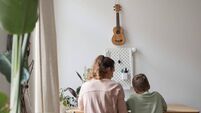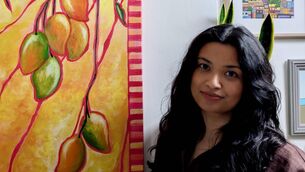My Career: ‘Most days begin with a ferry trip across the harbour'

Aisling said she didn't even know an Island Project Co-Ordinator existed as a job wehn she left school.
Name: Aisling Moran
Age: 42
Lives: Baltimore, West Cork
Job title: Project Co-Ordinator, Sherkin, Long, and Heir Island
Salary bracket: It falls somewhere within the typical salary range for community development roles — though, like many in this field, it’s as much a calling as it is a career – think purpose over private jets!
Education background: BA in English and History, Msc in Communications and Advertising, Dip in Youth and Community
Hobbies: Last year, I joined the local Mothers and Others team locally and it is some of the best craic I have had in a long time. We play a bit of ball, chat, and have the occasional social. I love travelling and camping, there is such freedom in exploring new places and camping with the kids.
Describe your job in five words: Anything and everything that sustains and develops island life!
Describe yourself in five words: Social, passionate, energetic, resourceful, and diplomatic.
Personality needed for this kind of work? A genuine interest in people, good listening skills, patience, and understanding. You will also need a thick skin and an ability to advocate for people.
How long are you doing this job? I came to Sherkin for a four-day a week job for eight months. I really thought I would have a great summer, meet some nice people, and be on my way again! That was 13 years ago, I guess I forgot to leave – but Sherkin and the island do that to you!
How did you get this job? I didn’t even know an Islands Project Co-Ordinator was a job when I left school. I always loved reading, stories and people, hence why I studied English and History. I went to college for the experience and studied something I really enjoyed and hoped that the rest would figure itself out.
I had a part-time job in college and was part of a committee to organise events and sell products. That led me on to TU Dublin for further studies. Advertising really taught me the importance of connections and visual presentations. While studying, I started to realise also that the big smoke advertising industry may not be for me, but I had paid for the Masters so I finished it out! I worked for a while on both the client and agency side of marketing and advertising, before packing my bags on a one way ticket for new adventures.
The world is full of possibilities and kind people - that is what I took from living out of a rucksack for a few years. I found myself solo travelling, broke in Perth, and the only job was working in an Eco Retreat in Karijini, a stunning part of Western Australia. On a rickety propeller plane I took a job that landed me in the outback. It was the most remote glamping spot I have ever been to on, Aboriginal land and run by an eco tourism company.
I started out as a receptionist and ended up being the liaison between the company and the local aboriginal community, at a time when the Australian Government was issuing an apology to the Aboriginal people. My love for community work was born. A stint as an accounts administrator, Bean an tí, a reality TV show and working with Chernobyl Children International landed me here in Sherkin.
Our islands hold a unique culture value to our history. They need the continued supports to thrive and develop into the future.
Do you need particular qualifications or experience? Experience working in communities, an understanding of the key practices of community engagement, and good communication skills. There is a large workload so an ability to write, communicate and prioritise is essential.
Describe a day at work?
Most days begin with a ferry trip across the harbour — sometimes under glorious skies, other days in rougher weather. No two days are ever the same, and, no matter how carefully I plan, there’s always an element of the unknown!
Today starts with our weekly online meeting for the Bachelor of Arts Programme, where we discuss plans, updates, and any concerns. Before the meeting even ends, two islanders arrive at the office looking for support with various needs. At 10.30 am, I meet with the Community Education staff and office team to plan activities and upcoming events for the week.
At 11am, I chair the Comhdháil Oileáin na hÉireann meeting — today we’re organising the upcoming AGM on Clare Island and discussing possible solutions for the housing challenges on the islands. After that, I move into a meeting about SICAP programming, focusing on community integration initiatives.
A new government strategy document on community development has been released, and since Comhdháil has already submitted a response, I spend some time editing that submission. I also make phone calls regarding the purchase of our local school building and check in with contractors about the progress on new construction works.
Later, I speak with a representative from Heir Island about road maintenance issues and brainstorm a new idea for a summer fundraiser. I review the latest applications for the Creative Places Steering Group — we have a meeting scheduled for tomorrow — and I update project documents in between.
Throughout the day, there are constant requests for assistance; islanders call to the door looking for help with printing, asking for directions, needing access to toilets, or raising more serious concerns. I send out text message updates to keep the island community informed about news and events.
By the time I realise I haven’t even opened my emails yet, the ferry is already due to depart — and it always leaves on time. I grab my things and dash for it, ready to start it all again tomorrow!
How many hours do you work a week? 40- plus.
What do you wear to work? It really depends on the day, I am mostly dressed casual, but on the days I have meetings, the look needs to be more island formal! Comfort is always key.
Is your industry male or female dominated? Both - there was a time where it was male-dominated and I have seen the pendulum swing in the other direction now with more females in the islands part of the industry.
Is your job stressful? How? Rate it on a scale of 1-10: This job has many graat moments of dealing with people and island communities. Essentially, sometimes you are making the case for islands to have the equal rights and access to similar services as the mainland. At times, this can seem like you are fire-fighting and become stressful.
This is more than just a job so when things don’t work out like housing or healthcare, it can mean real effects for people you care for and this can be upsetting and stressful.
Do you work with others or on your own?
I am very lucky to work with great volunteers and co-workers on the islands all around the coast of Ireland.
When do you plan to retire or give up working? When the kids finish school or when the work is done.
Best bits: The diversity of people you get to meet and exchange stories with. The communities I get to share life with. No day is the same and I am constantly learning new things. When progress happens, when people get homes, when communities get access to facilities or services. When our voice is heard.
Worst bits: Storm damage, and the never-ending fight to ensure island communities aren’t overlooked — it’s equal parts advocacy and endurance.
Advice to those who want your job? Be patient, be kind, and believe in the goodness of people.







 App?
App?


